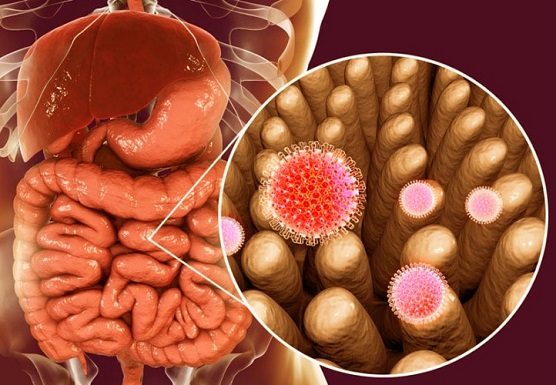Post-COVID-19 Digestive Issues Could Be Caused by Hidden Viral Reservoirs and Gut Microbiome Damage
Nikhil Prasad Fact checked by:Thailand Medical News Team Jun 04, 2025 8 months, 2 weeks, 1 day, 8 hours, 9 minutes ago
Medical News: Post-COVID-19 Gut Problems Linked to Virus Persistence and Gut Microbiome Disruption
A new study is shedding light on how digestive symptoms that persist long after COVID-19 may be tied to viral remnants hiding in the gut and significant disruptions in gut bacteria. These long-term complications, often dismissed as unrelated, are now being recognized as part of the broader post-COVID-19 syndrome—also called Long COVID—and they could be affecting millions globally.
 Post-COVID-19 Digestive Issues Could Be Caused by Hidden Viral Reservoirs and Gut Microbiome Damage
Post-COVID-19 Digestive Issues Could Be Caused by Hidden Viral Reservoirs and Gut Microbiome Damage
The research was conducted by Dr Cristina Stasi from the Department of Life Science, Health and Health Professions at Link Campus University in Rome, Italy, and Dr Massimo Bellini from the Gastrointestinal Unit and Regional Center for Functional and Motility Digestive Disorders at the University of Pisa. This
Medical News report explores the key findings from their comprehensive review, which analyzed the digestive effects of COVID-19 and proposed targeted treatment strategies, especially for irritable bowel syndrome (IBS).
Why the Gut Suffers After COVID-19
SARS-CoV-2, the virus responsible for COVID-19, enters human cells using ACE-2 receptors. These receptors are not just found in the lungs but also throughout the digestive tract. The presence of the virus in the gut can result in inflammation, disruption of the gut’s bacterial environment (microbiota), and damage to the lining of the gastrointestinal system.
After the acute phase of the infection, many patients experience lingering symptoms such as abdominal pain, diarrhea, nausea, bloating, and IBS. The researchers discovered that these symptoms often stem from alterations in the gut microbiota. These alterations include a decrease in beneficial bacteria and a rise in harmful, opportunistic pathogens like Klebsiella pneumoniae and Escherichia coli. These microbial imbalances, or "dysbiosis," can severely impact gut function and lead to long-term illness.
IBS and COVID a New Connection
One of the standout issues identified is the rise in cases of IBS following COVID-19. Studies showed that many individuals with no prior gastrointestinal issues developed IBS-like symptoms within three to six months post-infection. For instance, research across different countries found the incidence of post-COVID IBS ranged from 3% to 11.6%. Many patients reported symptoms like chronic diarrhea, constipation, or alternating bowel habits along with abdominal discomfort.
Researchers also discovered that the gut–brain axis—the communication network between the gut and the brain—could be thrown off balance by SARS-CoV-2 infection. This imbalance may be caused by inflammation, altered neurotransmitter activity, or prolonged immune response, all influenced by the gut microbiota.
Therapies That Show Promise
While conventional IBS treatments continue to be used, scientists are now look
ing into more targeted therapies for post-COVID-19 gut problems. These include:
-Probiotics and prebiotics: Several studies reported improvements in gut health, immune markers, and even mental health when patients used supplements containing beneficial bacteria.
-Dietary changes: A diet rich in fiber, fruits, and anti-inflammatory foods appears to help restore microbial balance. Beetroot juice, in one trial, improved fatigue and gut health in post-COVID patients.
-Vitamins and postbiotics: Supplementation with Vitamin K2, D3, and compounds like SCFAs (short-chain fatty acids) improved symptoms in many cases.
-Fecal Microbiota Transplantation (FMT): In a small open-label trial, transplanting fecal matter from healthy donors helped reset the gut microbiome in Long COVID patients, improving sleep and anxiety symptoms.
Is the Virus Still Hiding in the Gut
Mounting evidence suggests that SARS-CoV-2 may persist in the gut long after the initial infection. Several studies found traces of viral RNA in intestinal tissue, even seven months after recovery. This viral persistence is suspected to continue triggering inflammation and disrupting the gut’s normal functions.
As a result, researchers are also exploring antiviral medications. Drugs like Paxlovid (nirmatrelvir/ritonavir), remdesivir, and even repurposed HIV medications are being tested in clinical trials. Although early results have been mixed, they provide a foundation for future therapeutic approaches aimed at clearing lingering viral reservoirs.
Conclusions
The review concludes that digestive manifestations such as IBS are among the most overlooked yet debilitating symptoms of post-COVID syndrome. A combination of viral persistence, immune system dysregulation, and gut microbiota imbalance likely drives these chronic symptoms. Treatments targeting the gut microbiome—through probiotics, diet, and possibly antiviral medications—are showing promise. However, more long-term studies and trials are urgently needed to fully understand and manage these conditions. Early identification, microbiome restoration, and a personalized approach to treatment may significantly improve the quality of life for post-COVID patients suffering from gut-related symptoms.
The study findings were published in the peer reviewed journal: Pathogens.
https://www.mdpi.com/2076-0817/14/6/555
For the latest COVID-19 News, keep on logging to Thailand
Medical News
Read Also:
https://www.thailandmedical.news/news/many-exposed-to-covid-19-will-develop-acute-ischemic-colitis
https://www.thailandmedical.news/news/children-face-long-term-gastrointestinal-issues-after-covid-19-infection
https://www.thailandmedical.news/news/austrian-study-links-leaky-gut-to-long-covid-fatigue-syndrome
https://www.thailandmedical.news/articles/coronavirus
https://www.thailandmedical.news/pages/thailand_doctors_listings
